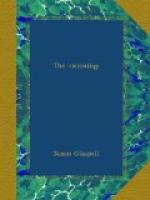“If you don’t see me any more, you won’t think those things. It’s easier to understand when things are all over. It’s easier to forgive people who are not around. After what’s happened I couldn’t be Ann if I were with you. That’s spoiled. But if I go—I think maybe Ann can stay. For both our sakes, that’s what I want.
“’Twas a lovely dream, Katie. The house by the river—the big trees—the big flag that waved over us—the pretty dresses—the lovely way of living—the dogs—the men who were always so nice to us—Last night I dreamed you and Worth and I were going to a wedding. That is, it started out to be a wedding—then it seemed it was a funeral. But you were saying such funny things about the funeral, Katie. Then I woke up—”
The letter broke off there.
CHAPTER XXIX
The next morning Katie did something which it had been in her mind to do for some time. She went to Centralia.
It was not that she expected Centralia to furnish any information about Ann. It was hard to say just why she was so certain Ann had not gone back to Centralia. The conviction had something to do with her belief in Ann.
Centralia, however, might be an avenue to something. Furthermore, she wanted to see Centralia. That was part of her passion for seeing the thing as a whole, realizing it. And she had a suspicion that if anything remained to forgive Ann it would be forgiven after seeing Centralia.
And back of all that lurked the longing to tell Ann’s father what she thought of him.
Katie was in a strange mood that day. She had read Ann’s letter many times, but had never finished it with that poignantly personal heartache of the night before. It was as if she were not worthy that new thing which kept warm in her own heart. For she had been hostile to the very thing from which the warmth in her own heart drew. The sadness deepened in the thought that the great hosts of the world’s people sheltered joy in their own hearts and hardened those very hearts against all to whom love came less fortunately than it had come to them. How could there be ’hope for the world, no matter what it might do about its material affairs, while heart closed against heart like that, while men and women drew their own portions of joy and shut themselves in with them, refusing to see that they were one with all who drew, or would draw. It seemed the most cruel, the most wrong thing of all the world that men—and above all, women—should turn their most unloving face upon the face of love.
Of which things she thought again as she passed various Centralias and wondered if there were Anns longing for love in all those unlovely places.
She came at last, after crossing a long stretch of nothingness, to the town where Ann had lived, town from which she had gone forth to hear grand opera and find the loveliness of life. But as she stepped from the train and approached a group of men lounging at the station it came to her that “Ann’s father,” particularly as Ann had not been Ann in Centralia, was a somewhat indefinite person to be inquiring for.




